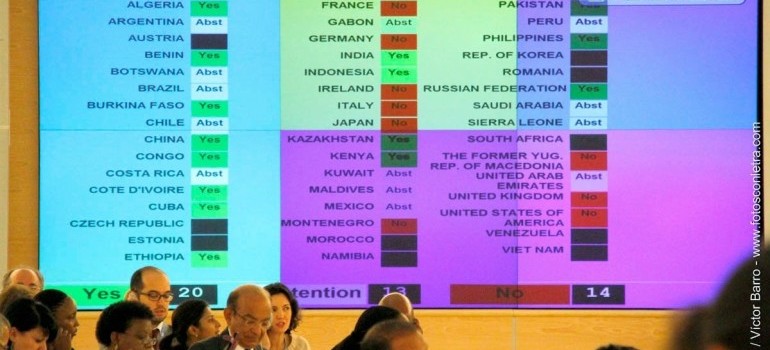Transnational corporations (TNCs) have become major and powerful actors.
The activities of transnational corporations are a source of multiple human rights violations
In many cases, especially when victims are from the Global South, impunity prevails. TNCs are indeed able to evade national jurisdictions because of the unprecedented economic, financial and political power they command, their transnational character, their economic and legal flexibility and the complex structures they use to carry on their activities.
Since the late 90s, the CETIM is firmly committed to ending the impunity of transnational corporations and ensuring access to justice for the victims of their activities. The CETIM supports social movements, trade unions and organizations representing victims and affected communities from the Global South in their efforts to access the UN human rights protection mechanisms. And the CETIM is involved to their sides in the campaign for new binding international norms to end impunity, providing its support for their participation in the negotiations and the presentation of their proposals.
Stop TNCs impunity Campaign
Access to justice for victims of TNCs
In 26 years of oil drilling in the Amazon region of Ecuador, Chevron (formerly Texaco) polluted more than 450,000 hectares of one of the planet’s richest biodiversity regions, destroying the living and subsistence of its inhabitants. After 21 years of litigation, and despite a ruling by the Ecuadorian courts, impunity continues for Chevron, and the victims of its activities in Ecuador are still waiting for justice and compensation. For its part, Chevron denied liability and has devoted enormous efforts and resources to get the judgement set aside, persecute the victims and silence their defenders.
Continue reading
HUMAN RIGHTS COUNCIL 28th session 02 March – 27 March 2015 [Excerpt from the statement] We also recognise the positive role that the Government has played in preventing environmental deterioration and water pollution by not granting mining permits. An emblematic case is that of the Australian-based company Oceana Gold, which insists on its will to […]
Continue reading
A formal complaint was submitted to the International Criminal Court (ICC) in The Hague against Chevron's CEO by the victims of the activities of this transnational corporation in Ecuador. In 26 years of oil drilling in the Amazon region of Ecuador, Chevron (formerly Texaco) polluted more than 450,000 hectares of one of the planet's richest […]
Continue reading
Historic: the Human Rights Council decides to launch negotiations on new binding international norms concerning the human rights responsibilities of TNCs!
Continue reading
The time has come for the Human Rights Council to adopt binding norms to end the impunity of transnational corporations! Countries and peoples of the Global South are the main victims of the asymmetry in the international system. We cannot rely on self-regulation and voluntary codes of conduct to discipline the most powerful actors in the global economy today.
Continue reading
« Previous
1
…
28
29
30
31
32
…
46
Next »



